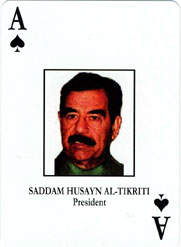OldSpeak
The Rise of Evil: Does Hussein Belong Beside Hitler?
By Neal Shaffer
May 14, 2003
With the war in Iraq all but over, the business of summing up and analyzing the process and its long-term effects can begin in earnest. There are, as would be expected, more questions than answers. Does an undeclared war need an official acknowledgment of its completion? Is the tough talk on Syria and Iran mere posturing, or are the seeds being planted for a widening of the conflict? Will the wishes of the Iraqi people be followed, or will the United States stick around to ensure that the new government is complicit with our interests? And, perhaps most importantly, just how well did the Bush Administration do in its campaign to sell this war to the American people?
Consistently high approval ratings would suggest that they have done very well indeed (although it is worth noting that Bush One enjoyed even higher numbers following the first Gulf War). The protest movement all but died, unfortunately, when it became hard to tell exactly what they were protesting. Who could really argue, in a way that people would find compelling, with the emotional impact generated by the image of Hussein's statue coming down? The whole affair went by so quickly that Bush has managed to seem correct without having to say, "I told you so."
What seems to have been lost on many pundits and the public as a whole is the curious twist the campaign took somewhere between the U.N. fiasco and the fall of Baghdad. Almost overnight, what began as a war to make the world safe from Hussein's Weapons Of Mass Destruction quickly became, when no such weapons were used or found, a war to keep the world safe from Hussein himself—a far different proposition but, as it turned out, a quick sell.
 |
It's easy to forget, but Bush had a serious problem in the early stages of the war. A noticeable body of opinion, domestic and foreign, was making its opposition known. Large-scale protests were taking place on a regular basis, and the Bush Administration was on the defensive. Then words like "liberation" and "freedom" started cropping up with increasing regularity, and Weapons Of Mass Destruction became something we would get back to after the business of doing what's right was finished. Then somebody—it's impossible to say who, or who first—played the ace from the bottom of the deck: Hitler.
In all of history there has never been a name so universally reviled as that of Hitler. And to equate somebody's actions with those of Hitler, or of Nazi Germany, is a slam-dunk proposition. It has to be used carefully, of course, because misuse can lead to backlash. But since nobody, even the opposition, had ever risen up (or wanted to) in defense of Hussein or his government, the play was a natural. Even good liberals got into the act, most notably Paul Berman, author of Terror and Liberalism. He argues, with varying degrees of persuasion, that, while Bush is wrong, the war to topple Hussein is right. Part of his rationale is that Hussein is a modern-day version of Hitler and we, the United States, have an obligation and a need to deal with governments of this nature.
It's an argument that could go either way, and it will no doubt rage even more fully if Bush attempts to engage other Middle Eastern countries. But the central question is this: Is it proper to justify national policy with what amounts to an emotional ploy? If Hussein is really as bad as Hitler, can't that case be made on its own? By playing the Hitler card, the administration has, in effect, cheapened its reasoning at the benefit of its effectiveness.
The debate became even more interesting with the various controversies surrounding the upcoming CBS miniseries Hitler: The Rise of Evil (it airs May 18 and 20). This made-for-sweeps event has been under fire since the start, as critics have claimed that it will attempt to "humanize" Hitler. Things reached fever pitch on April 11 when Ed Gernon, a producer on the series, was fired by CBS for making the following statement to TV Guide
It basically boils down to an entire nation gripped by fear, who ultimately chose to give up their civil rights and plunged the whole world into war. I can't think of a better time to examine this history than now.
Since nobody has actually seen the Hitler miniseries yet, it's impossible to assess just how responsible it is. But what we can see is an obvious double standard, one that puts the inconsistencies of the Bush administration into very clear terms.
 |
Secretary of Defense Donald Rumsfeld was quoted during the later stages of the war as saying, "Saddam Hussein is now taking his rightful place alongside Hitler, Stalin, Lenin and Ceaucescu in the pantheon of failed, brutal dictators." This is the argument that won the domestic PR war, but it's just one nuance of the broader issue. In considering history, it is incumbent on the present generation to be as inclusive as possible. And if that means considering the domestic situation in Germany, which allowed a man like Hitler to take power, then so be it. But that is non grata in the age of the Patriot Act and secret courts, of indefinite detentions and bookstore searches.
Hitler, in other words, is a perfectly acceptable touchstone if you happen to agree with the Bush Administration and its march to war. It's a safe play, and very effective. It's also overly simple and cheap. For the moment, that's okay. This might be the end of Bush's designs, and maybe we'll pack up and go home, having done something good for the world. But since we allowed them to get away with dangerous rhetoric this time, then what happens when the same language is used to describe our need to invade Iran? Or Syria? Or anyone else this administration deems unfriendly?
We have to hold our national policy to a higher intellectual standard. If it can be justified, the Bush Administration should justify it. But if our current leaders know that nobody will argue when it's a fight against "evil," then each of us should hope that we don't make a wrong move. Now, does that sound familiar?
DISCLAIMER: THE VIEWS AND OPINIONS EXPRESSED IN OLDSPEAK ARE NOT NECESSARILY THOSE OF THE RUTHERFORD INSTITUTE.


